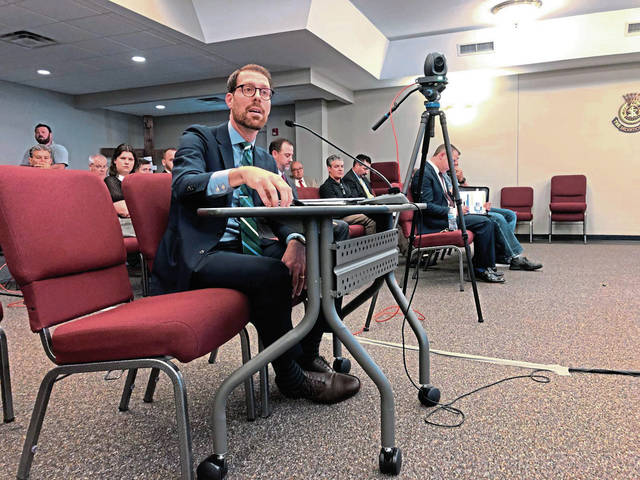https://naviga.triblive.com/local/valley-news-dispatch/state-house-committee-hearing-in-brackenridge-focuses-on-blight/
State House committee hearing in Brackenridge focuses on blight

Combating and preventing blight were discussed Thursday during a public hearing hosted by state lawmakers in Brackenridge.
Members of the House Urban Affairs Committee, including first-term state Rep. Carrie Lewis DelRosso, R-Oakmont, heard testimony from Allegheny and Westmoreland county officials and business owners during the three-hour hearing at the Salvation Army Allegheny Valley Worship and Service Center.
“We brought the committee out here, both Republican and Democrats, to really understand the situation, understand what we could do better with some of our policies and our laws, and how they actually work on the ground,” said state Rep. Rosemary Brown, R-Monroe County, majority chairwoman of the committee.
The hearing followed officials taking a tour of DelRosso’s 33rd District spanning Allegheny and Westmoreland counties on Wednesday.
“We heard from local officials as well as township managers on how it can be difficult to take a blighted property down,” DelRosso said. “We’re working through that.”
DelRosso said legislation has been proposed that would put blighted properties into a tracking system.
On the tour, Brown said they learned about the frustrations and obstacles encountered in dealing with blight, including in identifying property owners, banks and mortgages, and the process of acquiring blighted property.
“We’re looking at ways that we can really help and make a tremendous difference so that these properties can come off the market, they can be built back up and our communities can start to raise up with families and with businesses,” Brown said.
Those testifying during the hearing included Lance Chimka, Allegheny County Economic Development director; Jason Rigone, Westmoreland County director of Planning and Development and executive director of the Westmoreland County Industrial Development Corp.; and Greg Miller, manager of the Pittsburgh Land Bank.
Also testifying were Brackenridge Councilman Dino Lopreiato, owner of Vibo’s Bakery; J.P. Marino, assistant vice president of Washington Financial Bank and owner of the Plaza Professional Suites in Harrison; Joe Hughes, director of government relations for District 57 and a member of the Pittsburgh Building Trades; and Sean Watson, real estate owner of Commonwealth Investments, owner of Sustainable Matters and co-owner of botL restaurant and the Dattola Theater in New Kensington.
The full hearing is available for viewing online.
Chimka said many of Allegheny County’s municipalities struggle with blight, which is a legacy of the decline of the steel industry and the job and population loss that followed. He cited several programs the county uses to combat it, including the vacant property recovery program.
Marino noted the difficulties and time involved in acquiring blighted properties so they can be remediated. He cited the Heights Plaza Shopping Center in Harrison, which his family built. He said it has been mired in foreclosure and legal battles for years and looks like a blighted property but isn’t.
“It gets very frustrating. It gets exhausting,” he said. “It seems like there’s no light at the end of the tunnel.”
Rigone said the land bank Westmoreland County created is a powerful tool. It was used to address the now-demolished Monsour Medical Center in Jeannette.
Local code enforcement was cited as the front line of the battle. Chimka and Rigone commented on the benefits of municipalities working together to afford the cost.
Rigone said it would help if money was available to stabilize and preserve buildings so demolition isn’t the only option.
Lopreiato said blight was a major part of a comprehensive plan recently approved by the neighboring communities of Brackenridge, Harrison and Tarentum. He said communities need help dealing with blight, including commercial properties and the cost of asbestos mitigation.
Gov. Tom Wolf’s office recently announced the award of $12 million in grants to combat blight, including $2.1 million in Allegheny County and $1.3 million in Westmoreland County.
Copyright ©2026— Trib Total Media, LLC (TribLIVE.com)
